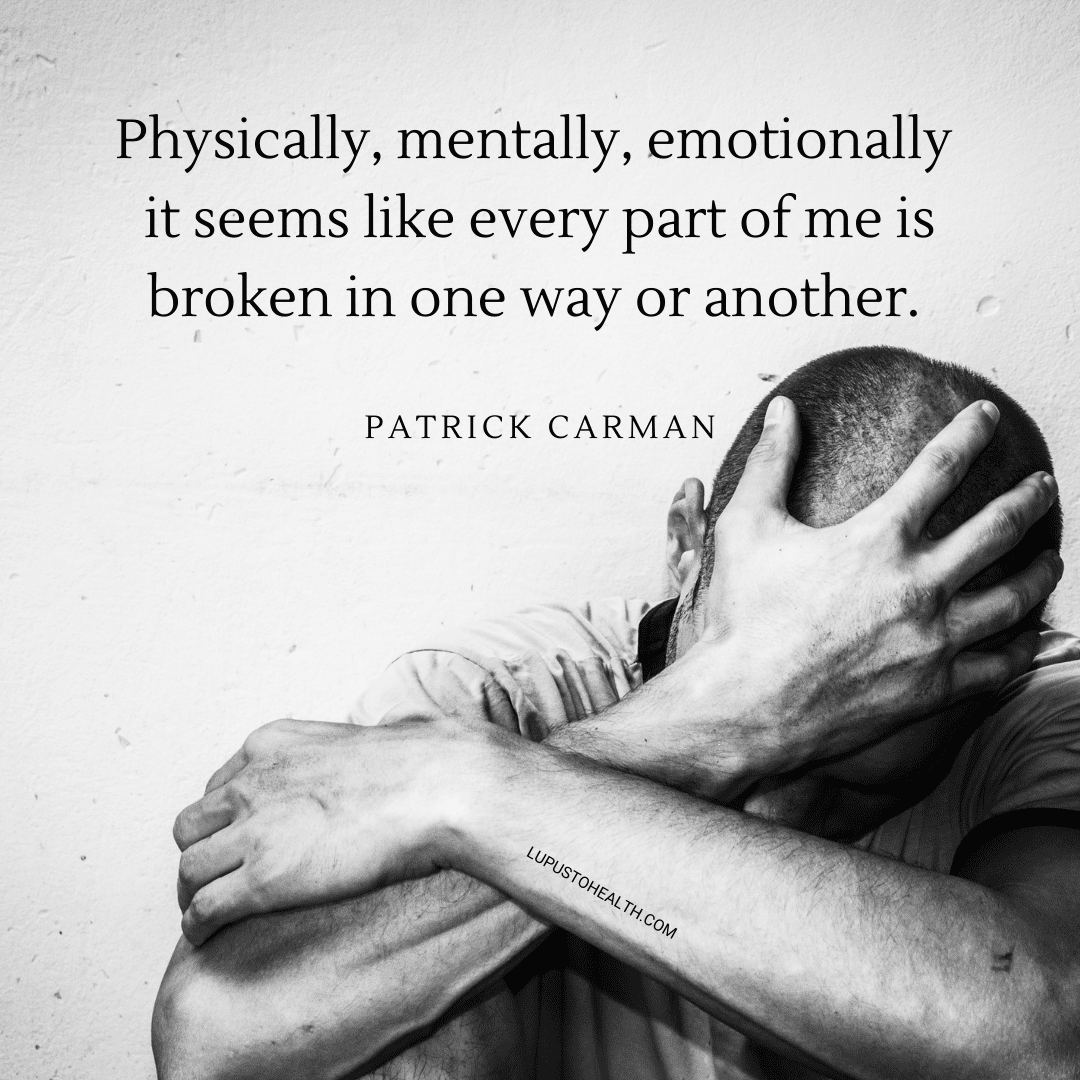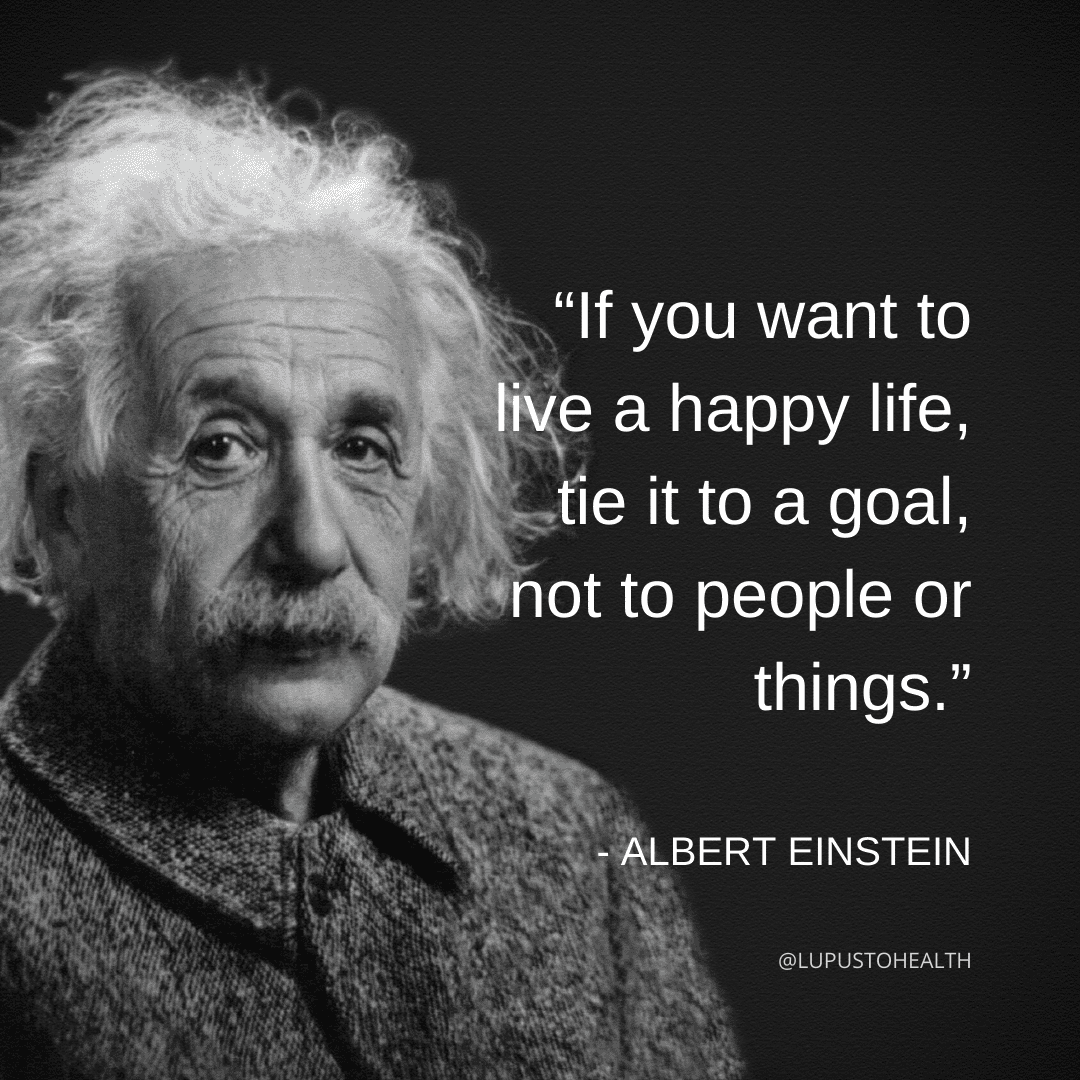I had a call today from my consultant about my latest blood test results.
My kidney function is good. But proteinuria and lupus antibodies are up… They want to increase my medication.
Frustrating. One step forward, two steps back!
It is approaching my 10th year of having lupus. Most of which, I have been in remission. So, why are kidneys leaking protein again now?
Could it be an after-effect of me having COVID? Seeing as it can activate immune cells that resemble what’s seen in lupus. [1]
God knows I have had enough lurgies over the past few months (having young kids and working in a public place for you).
Either way, my mood shifts from motivation to anger. At times I’m driven to clean up my diet 100% and tackle the disease head-on. Practice what I preach religiously. The next, I want to give up on life.
In all honesty, it puts me in a dark, empty place at times. Where it can even feel like gravity is against me.
Which begs the question…

Is Depression Common in Lupus?
More and more of us appear to be finding life depressing.
Sad to say, this seems to be a growing issue since around 2014 in the United Kingdom.
Work-life plays a big part in this. Wages haven’t been the same since ‘The Great Recession’ of 2008… in which the UK had the slowest recovery on record. [1]
It is fair to say that we would all like to, ‘work-to-live’. Yet it feels a lot more like we, ‘live-to-work’. For most, in underpaid and/or underutilised roles. And so, “the unemployed are unhappy and depressed and so are the underemployed.” [1]
So, no surprise that double the number of people take antidepressants today as there were 10 years ago. With 17% of the adult population in 2018 being on antidepressants in England alone. [2]
Throw COVID-19 into the mix and you can only imagine what the true depression and anxiety statistics are around the world.
One UK study suggests that levels of mental distress rose from 18.9% pre-lockdown, to 27.3% in April 2020. Over a quarter of the population. With the worst effect being on young adults, women, and people living with young children. [3]
Worrying statistics by any means.
But, believe it or not, they are nothing in comparison to depression levels seen in lupus patients.
If you have lupus, you face a 35% chance of developing depression [4]… this was before COVID also!
In other words, two years of putting a stop to life’s pleasures still cause less depression than lupus.
This is not something we can ignore. It is a condition we need to learn more about, recognise its symptoms and practice the solutions. This is what we will cover in this article.
– If lupus is new to you, Click here to learn what lupus is –

Can Lupus Cause Depression?
150 years ago, Viennese dermatologist Moriz Kaposi reported that mental changes may be part of systemic lupus. [5]
Since then, this has become known as “Neuropsychiatric Systemic Lupus Erythematosus (NPSLE).” [2] An ailment that 14% to 89% of lupus patients live with according to science. [6]
Think of the likes of “brain fog.”
Among the signs of NPSLE, depression is one of the most common disorders seen. Ranging from 2% to 91.7% in research papers available… which is much higher than in the general population. [7]
One theory behind these higher rates is pro-inflammatory immune responses. Small immune system proteins called “Cytokines”, autoantibodies, and complement factors can alter “neuronal activity”. [8][9]
Systemic lupus patients often produce more cytokines. These cytokine levels are part of systemic inflammation, which can lead to tissue injury. [10] In part due to the oxidative stress it creates.
Your body will create cytokines in response to: [11]
- Chronic Stress (Physical and Psychological)
- Sleep Deprivation
- Poor Gut Health
- Organ Disfunction (e.g., Hypertension and Nephritis)
- High Levels of Body Fat (i.e., Obesity)
Still, this is a complicated issue with many factors.
For example, corticosteroids like the prednisolone that you take can contribute to depression. [12] As can fatigue levels and how happy you are in life with your significant other. [13]

What Depression Looks Like?
Depression is common enough that 5% of the world’s adult population experiences it. [14]
Yet, the definition is still up for debate between psychiatrists. Some argue that depression is not one disorder. Rather, there should be different subgroups of depression. [15]
Still, today the criteria for diagnosing and rating the severity of Major Depressive Disorder is the criteria in the image below.

In general, depression can make you overexaggerate normal negative experiences.
Creating feelings of sadness, irritability, and emptiness. Accompanied by other symptoms that affect your ability to function, such as:
- Losing confidence, interest, and pleasure in things
- Experiencing sleep and/or weight loss
- Thinking and being negative all the time (Glass half empty every day, all day)
At its worse, depression may present psychotic symptoms like hallucinations and delusions. Even leading to suicidal thoughts and tendencies. [16]
Therefore, depression and anxiety can have profound impacts on your health and well-being. This includes higher rates of:
- Cardiovascular diseases [17]
- Heart attacks [18]
- Suicidal ideas [19]
- Physical disability [20]
- Poorer quality of life [21][22]
- Higher risk of early death [23]
How to Treat Depression in Lupus?
As it stands today, you are clinically depressed if you experience depressive symptoms for at least two weeks. In this case, you will more likely or not receive a prescription to take. If this has been the case for you, please do not come off your medication without speaking to your doctor.
If you are not at that point but feel you could easily slide that way. Here are three ways to help you fight depression and put it to BED:

#1. Be an Early Bird
As the saying goes, “an early bird catches the worm.”
It also appears that the early bird will be less likely to suffer from depression. [24][25][26]
This may be because society is set up to be more aligned to early risers… through the standard 9-5 working pattern.
You can be a natural early bird or a night owl. It is in your genetics. And if your sleeping pattern goes against your natural body clock, depression can be the outcome. [25]
No wonder shift workers have higher odds of depression. [27]
So, it goes without saying, stay away from shift work – if possible. Aim for a job role that allows you to stick to a sleeping routine at least. One that fits your natural body clock.
If you can, get an early night in order to be up bright and early. Help yourself by dimming the lights at night, and trying to get as much natural light by day as possible. Going for walk in nature would be an ideal example.
This is especially important if you struggle with sleep… as many other lupus patients do. [28]

#2. Exercise more; Eat better
Depression has risen as a result of us sitting around during lockdown. [29] Highlighting the link between inactivity and depression. As well as the importance of exercise in preventing this mental disorder. [30]
Like exercise, eating ‘healthy’ will do you good both physically and mentally. At least one study suggests that a healthy diet lowers both the risk and prevalence of depression.
The researchers support a diet rich in vegetables, fruits, berries, whole-grains, poultry, fish, and low-fat cheese. Fibre-rich foods. Stating that higher levels of folate are a big contributor to these lower depressive symptoms.
In contrast, eating a lot of sausages, processed meats, sugar-containing desserts and snacks, sugary drinks, manufactured foods, French rolls, and baked or processed potatoes will raise your risk. [31]
If this sounds like your diet, consider switching your diet to a more Mediterranean one. Eating meals rich in natural food products. Complimented, of course, with regular exercise.
Throw music into the mix and voilà, you’ve got a cocktail to kill depression. [32]

#3. Detach from your Phone
A 2020 study supports the idea that teenagers who dislike their looks have a higher risk of depression in early adulthood. Especially in boys. [33]
Body dissatisfaction affects up to 61% of teens worldwide. It can push them towards eating disorders, unhealthy behaviours, and poor mental health.
In the era of social media, it appears the increasing pressures on body image are affecting youngsters. Translating into depression later in life. [33][34]
So, it comes as no shock that social media use can trigger depression and anxiety. [35] For example, passive Facebook use encourages social comparison and envy. Which in turn leads to depression. [36]
Besides, the more time you spend using your phone, the more likely you are depressed. [35][37][38][39] In one study scientists could identify people with depressive symptoms with 87% accuracy. Their data suggests you have higher odds of depression if you: [37]
- Spend around 68 minutes a day on your phone
- Have less of a regular day-to-day schedule
This begs the question, what comes first, depression or phone dependency? Science says phone dependency. With depression coming second. [40]
So, put down your phone.
Take a break and engage in other activities that have nothing to do with appearance and comparing yourself to other people. Get out more; try visiting more locations. But at the same time, maintain a regular routine throughout the week.
But more so, restrict your social media time to 30-minutes or less a day. [38]

#BONUS. Set Goals and Plan Ahead
Self-help interventions are effective against depression.
One such intervention is Goal-setting and Planning… AKA GAP. It can improve your well-being and reduce depression. Even if you have a long history with this mental disorder. [41]
Framing life in terms of goals will improve your well-being. But only if you plan correctly.
Poor planning has the opposite effect… it can raise your odds of depression. Stemming from a higher chance of the plan failing.
So, set yourself achievable, self-concordant, positive daily goals. Planning well towards them. Where possible, opt for learning goals over trying to prove your self-worth. [42]
For instance, science says people with depression have more generalised personal goals. They set goals like, “to be happy” rather than “improve my 5k time this summer.” [43]
The answer is to set Specific goals… or more so, SMART goals:
- Specific – What do you want to achieve and why?
- Measurable – How will you know you are getting close to your goal?
- Achievable – Can you achieve the goal, given your available resources?
- Relevant – Does this goal take you a step closer to your vision?
- Time-bound – Set a deadline to keep things moving.
One final note, once you set your goals make sure you see them through to the end.
Aspiring toward personal and career goals can add meaning to your life. But, quitting and having a cynical attitude will cost you your mental health. Perseverance is the key to purposefulness. [44]
Final Thoughts
You could argue that modern life is rather depressing. This School of Life article does a good job at doing so.
Throw COVID-19 lockdowns into the mix and you have a concoction that can take you to a dark place.
So, imagine living with a life-long illness that raises your risk of depression from the inside… physiologically. Even before you consider real-life risk factors that mess with your mind.
For that reason, many of us with lupus suffer from poor mental health issues like feeling:
- Sad
- Irritable
- Empty inside
The good news is that you can help yourself out of this funk. But it will take effort and energy. Two things low in people who feel down.
Therefore, here are three easy steps you can take to help put depression to BED:
- Be an early bird – Wake up early each day
- Exercise more; Eat Better – A healthy lifestyle equals a healthy mind
- Detach from your phone – limit yourself to 30-mins of screen time
A good step to supplement these is to, set SMART goals and plan well ahead. This will give your life a ‘sense of purpose’… as long as you stay the course and see them through.
Remember, focus on the path rather than the goal!
Do you agree with these? Feel free to add your personal favourite ways to keep your mind clear.
Pingback: What is Lupus? -
Pingback: 1 Powerful Treatment for Lupus your Doctor doesn't discuss - but should! -
Pingback: 7 Daily Habits for a Healthy Heart with Lupus -
Pingback: Fighting Fatigue in Lupus in 2023 -